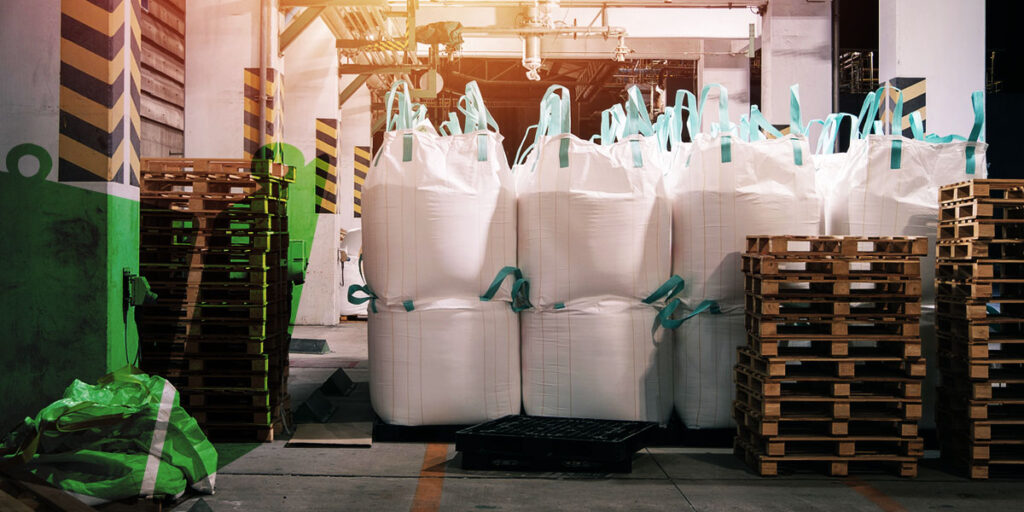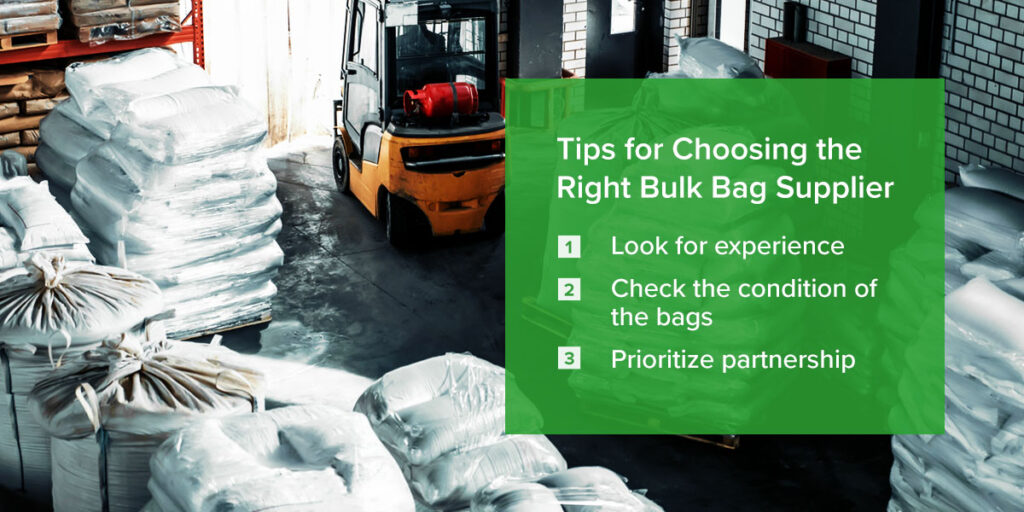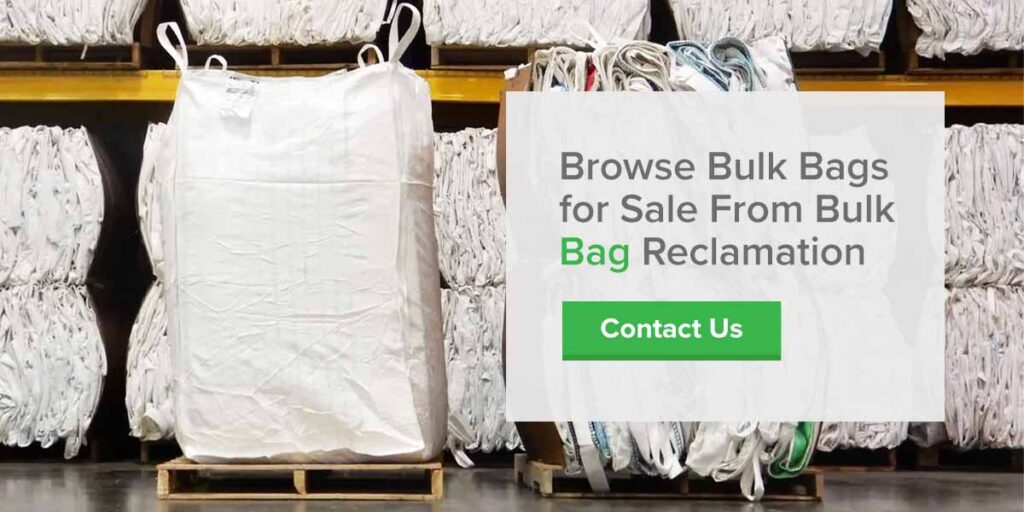What to Consider When Choosing a Used Bulk Bag Supplier
Industries including construction, agriculture and chemical manufacturing use flexible intermediate bulk container (FIBC) bags. Facilities can use these bags repeatedly and repurpose them for a wide range of tasks because they’re made to last for years.
Used FIBC bulk bags are a smart cost-saving measure for industrial organizations constantly moving, loading and unloading large supplies of products and materials. Buying reconditioned bulk bags that meet high standards can save your facility money and keep bags from going to a landfill.
As used bulk bag suppliers properly clean and test the bags, they may find tears and residue. Finding the right supplier for your used FIBC bulk bags makes all the difference, but it can be hard to know if you’re making the best choice.
Here are a few things to consider when you’re ready to buy used bulk bags for your operations. Keep these factors in mind when those lowest-price ads hit your search results, because they’re the lowest quality, too.
Table of Contents
What Materials Are Best for Used Bulk Bags?
Woven polypropylene is the main material for used FIBC bulk bags because it can be formed to the desired shape and provides high strength. Polypropylene allows bulk bag capacity to easily contain 2,000 to 4,000 pounds of materials. Different materials are added in or substituted in different parts of the bags based on the type of material they will be handling. For example, some bulk bags might include polyvinyl chloride (PVC) for enhanced durability and protection.
Non-conductive materials — such as uncoated polypropylene — are standard in bulk bags because of their strength and accommodation of non-flammable and non-combustible materials. However, these materials are not safe when your bags are in the presence of flammable gasses or solvents.
Threads in your used bulk bags can also be replaced in small amounts with conductive threads such as silver, steel or carbon to help keep them grounded and support a broader range of products. There are also antistatic materials and those that resist sparks to avoid ignition during discharge.
Look for materials that are designed for your specific industry and application. For example, some bags are specifically made for food-grade operations and must meet specific production and recycling requirements to comply with governmental regulations.
What Types of Bulk Bags Are Available?
You can choose from multiple types of used FIBC bulk bags, and there’s a big focus on electrostatic control and resistance. FIBC bulk bags come in different materials and present great savings when you select used options. They’re safe, effective and affordable.
Here’s a quick refresher on the different types of bulk bags that are generally available from bulk bag suppliers:
- Type A: These bulk bags are made from standard non-conductive materials and offer almost no static electricity. They’re designed for non-flammable, non-combustible materials and typically work best for larger items. Type A should never be used in a situation where solvents or flammable gasses could come into contact with your bag.
- Type B: These used FIBC bulk bags have a relatively low breakdown voltage and give minimal protection against static electricity. They can store most safe goods as well as flammable powders. However, a location with solvents or flammable gasses would not be appropriate for these bags.
- Type C: This bag selection uses a small number of conductive threads mixed within the bag’s composition and offers a stable bottom. This bottom must be connected and grounded when the bag is emptied or filled. This allows it to use flammable powders safely and is safe in areas where solvents and gasses may be present. Please note you should never use a Type C bag that has been torn, damaged or otherwise compromised — it is unsafe, and you should contact your vendor for a replacement right away.
- Type D: This type of used bulk bag is specifically designed to guard against discharges and sparks thanks to a combination of static-reducing and antistatic materials. The big benefit of these is that you don’t have to keep them on the ground during use. They can work with a wide variety of flammable environments, but they will lose their safety capabilities if they become covered in grease.
Bulk bags are also available in several styles that provide unique advantages. Some common bulk bag designs include:
- Duffle top: These bulk bags feature a duffle top that allows users to fully open or close the top inlet.
- Spout top: A spout top bag has a channeled spout top for less messy filling and discharging.
- Open top: An open top bulk bag is ideal for manual filling or materials that require ventilation because it has a wide open top.
- Baffled: Baffled bulk bags are designed with panels to retain the bag’s shape when filled, making them the perfect solution for stacking and storing bulk bags.
Tips for Choosing the Right Bulk Bag Supplier
Once you know what type and style of bulk bags you need for your facility and application, you can decide on a bulk bag supplier. Going with a used bulk bag supplier can be the most economical decision, but it’s only worth the savings if the bags are of high quality and will safely and securely store your materials.
Locating a reliable bulk bag supplier with the experience and infrastructure to ship your bags to you quickly is also critical. Here’s how to find the right bulk bag supplier for your needs:
- Look for experience: A bulk bag supplier with industry experience will provide the expertise and reliability your company needs. It is also helpful to have a bulk bag supplier that can provide fast and convenient shipping.
- Check the condition of the bags: The cheapest used bulk bags may not have the quality you need for reliable performance. It is essential to ensure the used bulk bags are in good condition. If you buy from Bulk Bag Reclamation, you can receive a free sample of our bulk bags to determine whether the bags are a good fit before you buy.
- Prioritize partnership: The ability to work with your used bulk bag supplier to find the bags suitable for your industry and business is valuable. Your supplier should be able and willing to work with your team to ensure you get suitable bags.
What Quality of Bulk Bags Can You Expect?
When you hear “used,” do you automatically picture torn, frayed bags that will spill your goods across every floor?
Well, it’s time to get rid of that mental picture and replace it with a shiny, like-new bag with a discounted rate on its sticker. At Bulk Bag Reclamation, our bulk bag reclamation and processing service looks at every used bag and inspects them for reliability and cleanliness. We hold our reconditioned bulk bags to the highest possible quality standards, so you can depend on their capabilities.
Each used FIBC bulk bag is checked for tears or other issues to ensure it is structurally sound. The next step in the refurbishment process is making small repairs to the bag. We then clean the bags to minimum residue standards and verify that all of the discharge spouts, loops, tops and bottoms are in working order. We run a complete bag diagnostic to ensure our bags are safe and reliable, specifically matched to your operational requirements. For example, we ensure bulk bags intended for agricultural use are safe to hold products like feed, grain and seed.
Choose a provider who gives you the same quality as a new bag. Small suppliers will try to compete on price but often run into inventory problems, while cheaper suppliers won’t give you a detailed inspection, so you may not have safe operating conditions.
How Much Does Customer Service Matter?
What happens when you order a bulk bag? Do you enjoy the process, know when it will arrive and feel satisfied when the order is complete? Used FIBC bulk bags are a great way to save on your cost, but that doesn’t mean you should drop customer service requirements. Your operations depend specifically on these bags, so you want a partner who works with your business and responds to your needs.
Work with a large provider that has your bags in stock when you need them and is available when you need them. Delays, cancellations and improper order fulfillment can hurt your bottom line. Keep your revenue safe and secure by choosing used bulk bags and working with a provider that always has time for your needs.
Browse Bulk Bags for Sale From Bulk Bag Reclamation
If you know how to find the right bulk bag supplier, used bulk bags can provide your company with high-quality bags at significant cost savings. Bulk Bag Reclamation is here to deliver high-quality lined and unlined used bulk bags to you starting today. We hold our bags to the highest possible industry and environmental standards. We also offer reconditioning services if you have bags that need repairs.
With our strict quality assurance program and a management team with a combined 25 years of experience in the FIBC industry, you can be confident that your bulk bags will meet your needs. To find out how we can help you, contact us today.



